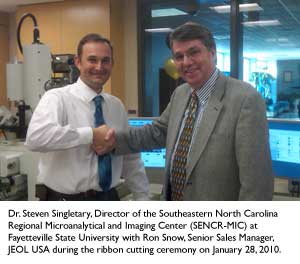February 8, 2010, Peabody, Mass. — The installation of an advanced imaging tool, a JEOL Electron Probe Microanalyzer (EPMA), will expand research and educational opportunities for students, faculty, and industry in southeastern North Carolina. In January, JEOL completed the installation of its new generation of EPMA, also known as a microprobe, at the Southeastern North Carolina Regional Microanalytical and Imaging Center (SENCR-MIC), a state-of-the-art facility opened in 2009 as a joint collaboration between Fayetteville State University and The University of North Carolina at Pembroke.
 The center held a grand opening ceremony on Thursday, January 28, 2010, and the Director of the SENCR-MIC, Dr. Steven Singletary, couldn’t have been more excited for his home state, the Universities, and his students. “We don’t have major funding here but we went after it for the ‘probe and we got it. We hope to give students the same research opportunities as they would have at MIT and UCLA,” said Singletary, who obtained his Ph.D. in Geochemistry at the Massachusetts Institute of Technology using a JEOL microprobe. An Assistant Professor of Geology and Chemistry in the Department of Natural Sciences at Fayetteville State University, he teaches students in the natural sciences, physics, chemistry, geology, toxicology, fire science, and forensic science programs.
The center held a grand opening ceremony on Thursday, January 28, 2010, and the Director of the SENCR-MIC, Dr. Steven Singletary, couldn’t have been more excited for his home state, the Universities, and his students. “We don’t have major funding here but we went after it for the ‘probe and we got it. We hope to give students the same research opportunities as they would have at MIT and UCLA,” said Singletary, who obtained his Ph.D. in Geochemistry at the Massachusetts Institute of Technology using a JEOL microprobe. An Assistant Professor of Geology and Chemistry in the Department of Natural Sciences at Fayetteville State University, he teaches students in the natural sciences, physics, chemistry, geology, toxicology, fire science, and forensic science programs.
![]() Watch the YouTube Video of Microprobe Installation at FSU
Watch the YouTube Video of Microprobe Installation at FSU
The microprobe, as the term implies, enables detailed surface analysis that reveals a wealth of information about both hard and soft samples. FSU and UNC Students will have access to this highly sophisticated electron microscope to advance environmental, geological, and forensic science research. “We’ll be able to use it to compare paint chips, analyze soil samples, gunshot residue, micro tool marks – this is an unexplored field because I don’t know of anyone using a microprobe in forensics and I’m hoping it will bolster graduate studies. We’ll develop new techniques and apply old ones in novel ways.”
Singletary sees this new resource as benefiting both future careers and the future of the region in southeastern North Carolina. Research at this level is a unique opportunity for students who typically hold down jobs while attending school and have responsibilities that would prevent them from obtaining this type of training away from home. “These students have the intellectual ability and curiosity to do the work, they just don’t have the opportunity to do the work. By having the ‘probe here, we can do the research here,” Singletary said. He and his fellow faculty members are hopeful that access to this advanced instrumentation will produce a more highly trained workforce, which will in turn attract more businesses to the area.
The SENCR-MIC will be a resource for both Fayetteville State University and the University of North Carolina at Pembroke. Additionally, local industry and government will have access to the facility for research. Federal funding for the microprobe came from the Department of Defense.
Fayetteville State University is one of 17 institutions that comprise the multi-campus University of North Carolina. Founded in 1867 as the Howard School for the education of African Americans, FSU has nearly 7,000 students and is among the nation’s most diverse campuses. The University of North Carolina at Pembroke is an historically American Indian University. Singletary noted that he obtained his undergraduate degree at UNC Pembroke, and his mother graduated from Fayetteville State University.
https://www.jeolusa.com/NEWS-EVENTS/Press-Releases/PostId/91/New-JEOL-Microprobe-Helps-Advance-Research-Opportunities-for-Students-and-Industry-in-North-Carolina





